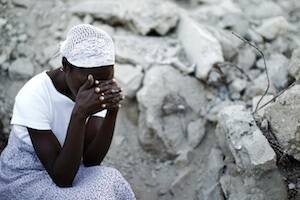One year after a devastating earthquake struck Haiti, killing 220,000 people and making 1.5 million others homeless, the citizens of the poorest country in the Western Hemisphere have achieved a lot with international aid, but much more needs to be done, a senior United Nations official said today. “Clearly, speeding up the reconstruction and recovery effort is the absolute priority for 2011,” the U.N. humanitarian coordinator for Haiti, Nigel Fisher, said in New York two days before the anniversary of the disaster. The U.N. estimates that 810,000 people are still living in 1,150 camps in Haiti, just over half the peak of 1.5 million in July 2010. Of the 700,000 who have left the camps, about 100,000 have been relocated into 31,000 transitional shelters. People are returning to their homes but are living in their yards because they are afraid of further collapses. Meanwhile, 95 percent of Haitian children who were going to school before the quake have returned to their classrooms.
Haiti's Recovery Continues
Show Comments (
)
Comments are automatically closed two weeks after an article's initial publication. See our comments policy for more.
The latest from america
Perhaps it is the hard-won wisdom that comes with age, but the Catholic rituals and practices I once scorned are the same rituals and practices that now usher me into God's presence, time and time again.
"Only through patient and inclusive dialogue" can "a just and lasting conflict resolution can be achieved" in the long-running conflict between Israelis and Palestinians, said the Holy See's permanent observer to the United Nations.
The ”Bad Guys” films ask, how do we determine who the “bad guys” are? And if you’re marked as “bad” from the start, can you ever make good?
In these dark times, surrounded by death and destruction in Gaza, we hear the command in the first reading, “Choose life.” What are the ways we can do this in a world that seems to have gone mad?








